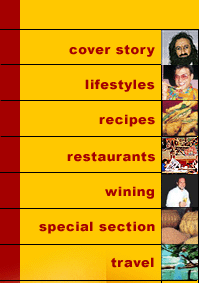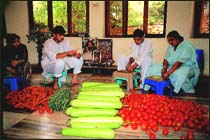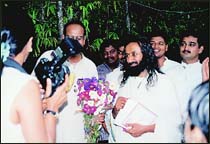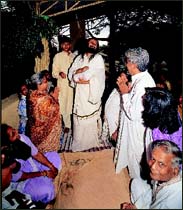


|
cover story Thayir Sadam And Payasam! At the Ved Vignan Maha Vidya Peeth in Bangalore, MARK MANUEL meets spiritual guru SRI SRI RAVI SHANKAR and learns from him the �Art of Eating�. |
|
Continued....
When Guruji gets into the kitchen, naturally, there is great cause for celebration, Hegde and Girish confess. They like it when he does that. But Guruji does not cook that often anymore. The cooks recall his cooking a pulao and mixing a fruit salad there recently. �Was it tasty?� I ask. �Of course, it was tasty,� they say indignantly, offended that I should ask such a question. �Does Guruji select the ingredients himself when he cooks?� I push further. �Does he go to the market?� �The market comes to the ashram,� I am told haughtily. Actually, the kitchen sends a van to the nearby Krishna Rajendra Market where the produce is sourced from. The ashram has its own gardens for carrots, greens, pumpkin, beetroot, tomatoes and ladyfingers, but this is not enough to feed 8,000 at a time, I should imagine. Lunch is over and I am dying for a cup of tea. �Since I am in Bangalore, even coffee would be fine,� I say hopefully to Hegde. He gives me a blank look. �We don�t drink tea or coffee here,� he replies. �Guruji doesn�t like it.� I start to think dark thoughts about Guruji. �But I thought you said he was meeting me after tea,� I tell the sexy disciple accusingly. �Yes,� she cooly replies. �I meant tea-time.� Hegde suggests helpfully. �You can have milk. Or coconut water... maybe ice-cream, some juice?� I settle for ice-cream and buy a round (yes, it�s got to be paid for) for the disciples who are with me, and then we move on for my meeting with Guruji. His abode (I cannot call it a residence nor an office, abode suits the place just fine) is on a small incline, and looks like the kind of place one would expect to read about in an Enid Blyton book. A twisting path leads up to it through verdant gardens. And a bell hangs outside the solid wooden door for visitors to ring and enter. Inside, there is the smell of incense. And there is a sense of peace. I take the circular abode in with amazement. There are three chairs in the room, one for Guruji, the other two on which all kinds of things are dumped. Visitors have to squat on the floor on mats.
Realising I have little time with him, I am quick to get the interview started. I tell him I am there to discuss food and his eating habits. Guruji strikes the spiritual note rightaway. �Jaise aan, vaise maan,� he says. �As is food, so is your mind.� �Which means, what...� I prompt him. �Which means food is meant to be eaten and enjoyed. Eat it slowly... it will bring some harmony into your life. Eat it quickly, it will cause restlessness. Eating is man�s most sacred act of the day. Offer food to God, to your fellow being, it is a most uplifting and holy act, then eat yourself.� He begins quoting in Sanskrit about Ayurvedic foods and the six different tastes he gets in every meal. And what he is saying is beyond my understanding. �While eating, there should be no meeting,� Guruji says mystically and almost jovially. �You won�t enjoy your meal. Eat with a smile, play music, taste the food! I eat in silence. I am not engaged in other things when I eat. I am 100 per cent in the food. And I take small quantities. I don�t stuff myself. This does not give satisfaction, it only causes craving for more and more.� �Yes, yes,� I tell Guruji impatiently, �but does that mean you are a foodie?� He ponders awhile, head tilted to one side, artistic hands stroking his fine, bushy moustache. �There�s nothing like that,� he declares finally. �Everything has its place. I don�t give too much attention to food and my eating habits. I eat to live... not live to eat. And I like to be happy... so I am cheerful especially while eating. Even when cooking, one should be in a pleasant mood. A stressed mind affects all those who eat the food. It is important for cooks to be cheerful, to be uplifted.�
�When was the last time you cooked,� I ask Guruji, who is already showing signs of restlessness and wanting to go. �On May 15, in Canada,� he replies promptly, �at one of our ashrams. I cooked something Indian, something European, a little pasta, a dish with ten different grains, I experiment a lot with food, I experiment with all sorts of recipes. I like to be creative, different, I like to play around... you understand?� �Well almost,� I say, as he gets up and sweeps majestically out of the room, his train of disciples following. I don�t know about the Art of Living, but if you want to know what the Art of Eating is all about, I�ll tell you. It is Thayir Sadam and Payasam!
|

Home Page

 Next to Guruji�s throne is a big plate of flowers, bananas, mangoes and other fruit that he obviously gives out as prasad. There are paintings on the walls, books lying all over the place, peacock feathers, candles, wind-chimes of all shapes, sizes and colours, statues of Jesus, a reclining Buddha, Lord Ganesh, a dancing Shiva, there is a copy of the Koran on a stand, brass vases with plastic flowers, a flute, a pot of honey, Valentine cushions, a collection of turbans, a Ken Star cooler that keeps humming, a phone that never stops ringing, and a group of bearded disciples that sit watching me silently. One gets up after some time and switches on a tape-recorder, and as if on cue, Sri Sri Ravi Shankar sweeps into the room.
Next to Guruji�s throne is a big plate of flowers, bananas, mangoes and other fruit that he obviously gives out as prasad. There are paintings on the walls, books lying all over the place, peacock feathers, candles, wind-chimes of all shapes, sizes and colours, statues of Jesus, a reclining Buddha, Lord Ganesh, a dancing Shiva, there is a copy of the Koran on a stand, brass vases with plastic flowers, a flute, a pot of honey, Valentine cushions, a collection of turbans, a Ken Star cooler that keeps humming, a phone that never stops ringing, and a group of bearded disciples that sit watching me silently. One gets up after some time and switches on a tape-recorder, and as if on cue, Sri Sri Ravi Shankar sweeps into the room.
 �Are you like that when you cook,� I ask cleverly. Guruji smiles, �I take my chances now and then and cook for devotees and guests. Cooking is my hobby. But I enjoy it more in the West, in Europe, I can teach the people there about Indian food. The ashrams abroad are more manageable for this kind of thing, the kitchens are manageable. Here our camps are so big. I can cook for 400, 500 at a time, not 1,000! Besides, our cooks here are very good. Why should I cook?�
�Are you like that when you cook,� I ask cleverly. Guruji smiles, �I take my chances now and then and cook for devotees and guests. Cooking is my hobby. But I enjoy it more in the West, in Europe, I can teach the people there about Indian food. The ashrams abroad are more manageable for this kind of thing, the kitchens are manageable. Here our camps are so big. I can cook for 400, 500 at a time, not 1,000! Besides, our cooks here are very good. Why should I cook?�